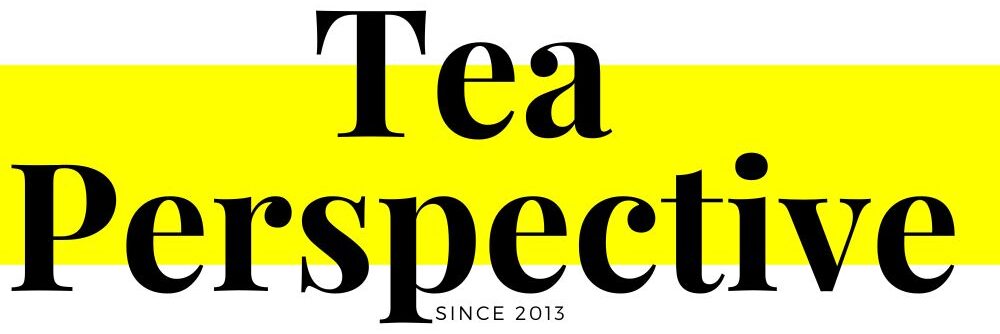So, does jasmine tea have caffeine? There is no caffeine in pure jasmine tea. But, jasmine tea is often combined with other true teas, like green tea, to improve its taste and health advantages. In these instances, it may include caffeine.
If you’ve ever had tea at a Chinese restaurant, you’re likely to have had jasmine tea. Jasmine tea is the most well-known variety among the many Chinese fragrant or floral teas. The tea pairs well with savory dishes, but it also tastes great on its own or as part of a sugary treat. Jasmine is also one of the most famous scents in the world!
Subtle, floral, and elegant — these three words perfectly describe the beverage. But does jasmine tea have caffeine? As mentioned above, pure jasmine teas do not contain any caffeine. However, many tea brands offer jasmine tea blends, which may contain caffeine. Read on to learn more about it!
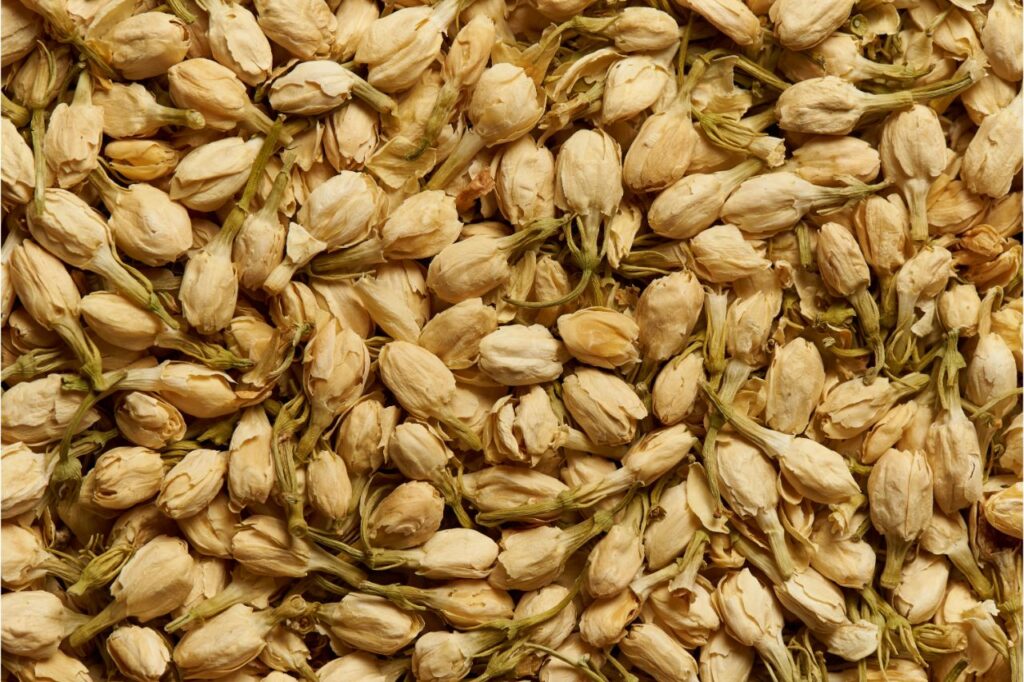
What Is Jasmine Tea?
Jasmine tea comprises both real tea leaves and jasmine flowers. Jasmine blossoms are generally obtained from the Jasminum officinale, a common type of jasmine plant.
Today’s distinctive jasmine teas are produced from either the ordinary jasmine plant (Jasminum officinale) or the Sampaguita plant (Jasminum sambac).
Jasmine blossoms, closely linked to the olive plant, have a rather aromatic scent with a delicate aftertaste. This herbal tea is often marketed under the name jasmine pearls. As the tea steeps, the tiny pearls unfold, producing a lovely appearance.
Caffeine Content of Jasmine Tea
Pure jasmine tea has absolutely no caffeine. But, nowadays, tea companies often mix Jasmine with other true teas — primarily green tea. When people think of jasmine tea, they usually refer to flavored or blended green tea. Therefore, since green tea and other true teas come from the Camellia Sinensis plant, jasmine tea will contain caffeine too.
Jasmine tea blended with true teas has the same caffeine content as the true tea base. Depending on the type of true tea used, you can expect a caffeine level of around 28mg per cup.
Numerous variables also influence the tea’s caffeine content, including tea variety, growing circumstances, and processing methods. The brewing process also affects the final caffeine concentration.
For instance, a minute of steeping results in a caffeine concentration that is 50% compared to 3 minutes of steeping.
Some tea companies mix Jasmine with herbal teas. In these cases, this jasmine tea blend does not contain caffeine since herbal teas are caffeine-free.
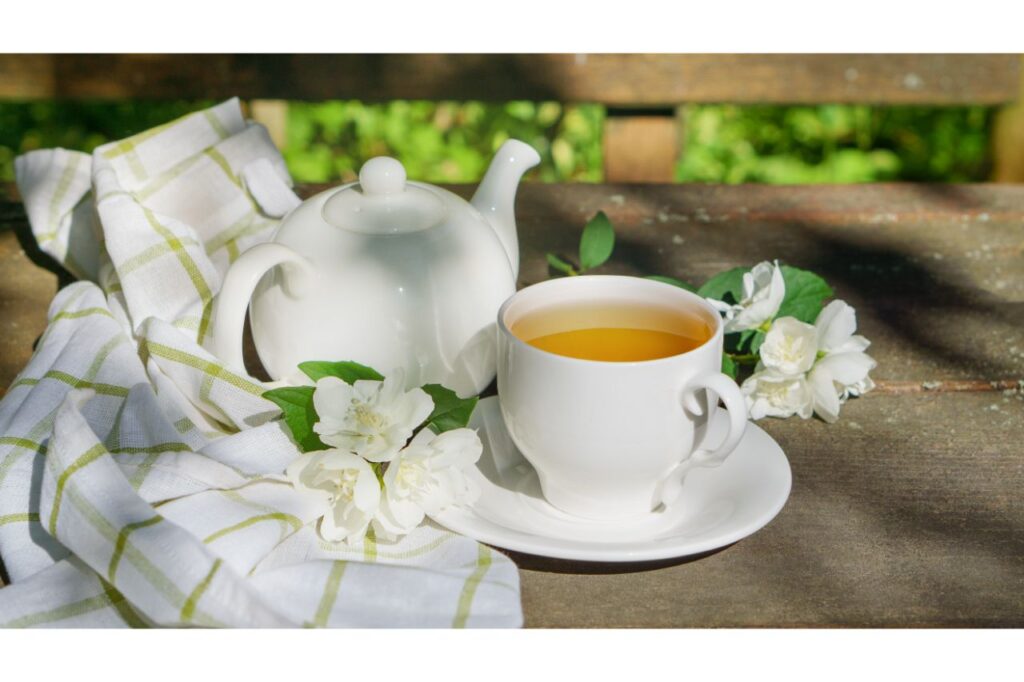
Types of Jasmine Tea
Knowing the types of jasmine tea will make it easier for you to grasp the caffeine content in each cup. We’ve compiled a list of the most popular jasmine tea blends and an estimate of how much caffeine each one has. But remember that these are only approximations. The caffeine concentration might vary considerably based on brand, processing, brewing, and harvest season.
Jasmine Black Tea
Most tea plantations harvest black tea by letting the tea leaves cure and oxidize upon harvest. This method produces enzymes that change the taste and look of the leaves.
Unlike other teas created using more traditional methods, black tea undergoes a more complex procedure.
This robust, earthy flavor is retained in the scented black tea, while the sweet flowery aroma of Jasmine offers a sweet balance.
A cup of black jasmine tea, which has the highest caffeine of any tea kind, usually contains roughly 50 milligrams of caffeine.
Jasmine Oolong Tea
People find oolong as one of the most intricate tea types since it may contain qualities of black tea, green tea, and a lot more teas.
Oolong teas are slightly oxidized. To get the appropriate taste, tea manufacturers meticulously regulate the oxidative degradation of oolong tea, putting it to a stop at precisely the perfect time. One sort of oolong may have a woodsy taste, while others might be sweet, herbaceous, and invigorating.
If you’re looking for something with less caffeine than black jasmine tea, you’ll find that jasmine oolong tea contains around 40 mg of caffeine per cup.
Jasmine Green Tea
Green tea possesses a fresh, natural taste because it is minimally oxidized. These qualities make it perfect for a jasmine tea base. The leaves are fresh, which mixes particularly well with flowery scents.
Before getting scented with Jasmine, the leaves are air-dried. This process helps retain their green hue. Afterward, the leaves go through a steaming or cooking process.
No matter how they’re prepared, all of the phytonutrients and polyphenols in green tea stay intact, including chlorophyll and polyphenols.
Jasmine green tea has around 30 mg of caffeine per cup. It is often lower than black or oolong teas.
Jasmine White Tea
White teas undergo the least amount of processing of all the tea varieties. After harvesting, the white tea leaves are not cooked at all. Instead, they are air-dried in the sun to stop the oxidation process as soon as possible. This drying process can be rather challenging to get right.
Tea manufacturers must carefully control the temperature and humidity to dry the tea quickly without browning it.
White tea has a minor caffeine content of all the true teas, at about 20 milligrams per cup.
Jasmine Herbal Tea
In comparison to other types of tea, finding herbal jasmine tea might be a bit of a challenge. Some specialty shops sell this kind of tea, which only consists of pure jasmine flowers. Moreover, some stores even craft their own jasmine flower herbal mixtures.
Herbal teas are not brewed from Camellia sinensis plants. Because of this, there is no caffeine in herbal teas. They are just infusions of various herbs and spices. Teas such as mint, licorice root, and orange spice are other typical herbal teas.
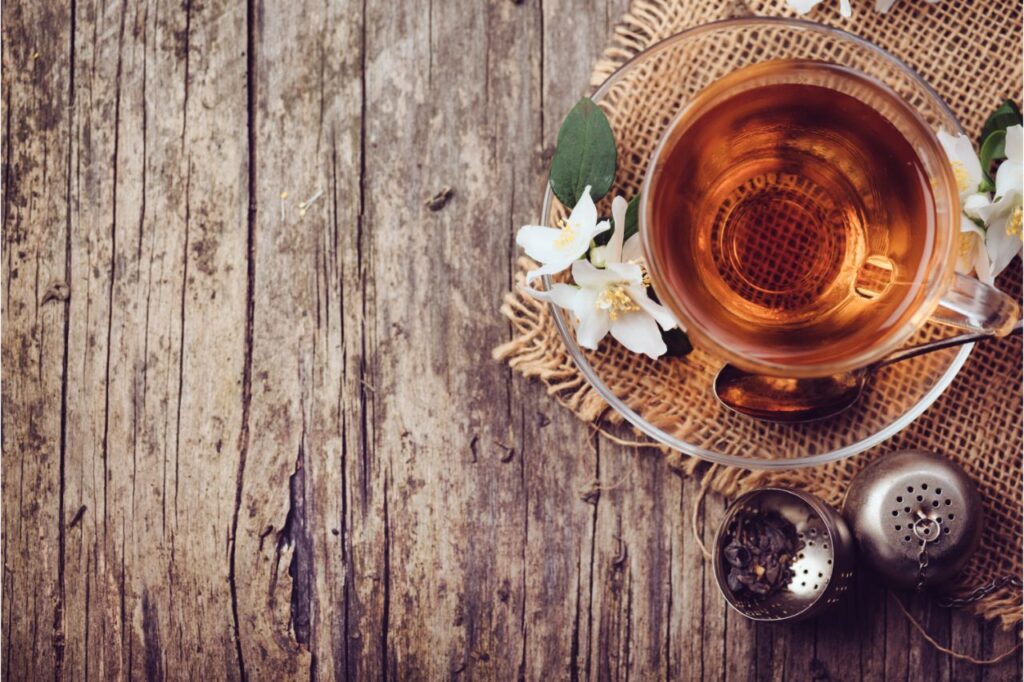
Health Benefits of Jasmine Tea
In addition to being tasty, jasmine tea is an excellent source of antioxidants and other health benefits. Here are some of them:
A Good Source of Antioxidants
The antioxidants found in abundance in Jasmine include:
- Flavonoids
- Catechins
- Alkaloids
- Phenols
- Proteins
Flavonoids may prevent damage to your cells and minimize inflammation. On the other hand, catechins may enhance the body’s immune system, thereby decreasing the chance of illness. Lastly, phenols may aid in the repair of damaged cells and the accumulation of oxygen within your bloodstream.
The antioxidants in the Jasmine flower make it an excellent curative flower for a wide range of conditions and chronic sickness symptoms.
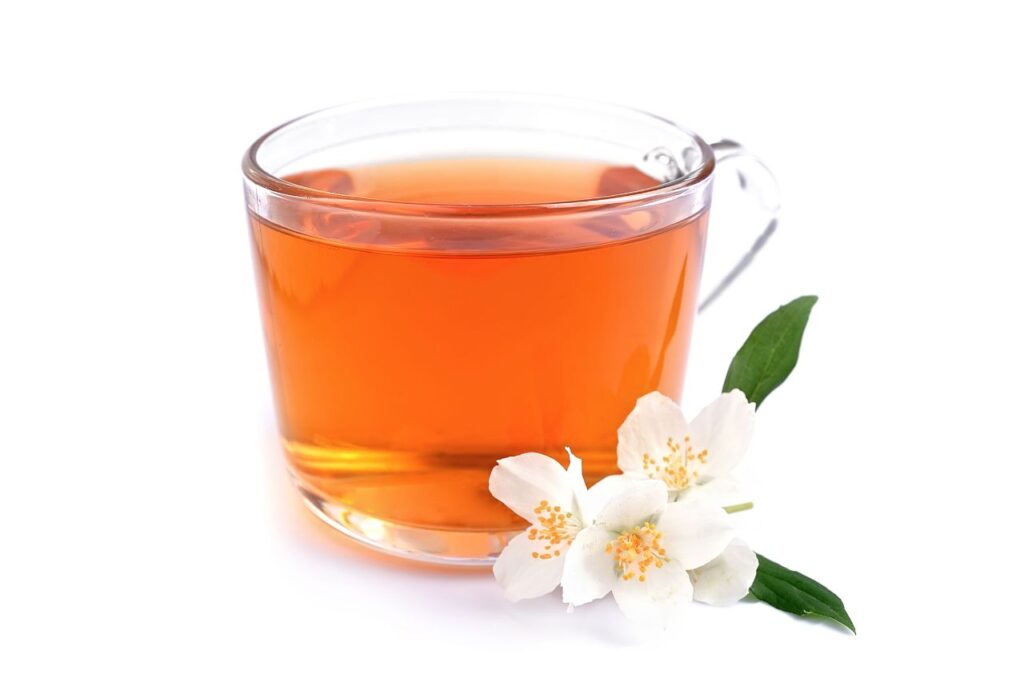
Gastrointestinal Health
Recent research discovered that the Jasmine flower was an efficient inhibitor of bacterial growth, specifically Escherichia coli.
This bacteria causes numerous gastrointestinal disorders. It also induces nausea and stomach flu.
According to the findings, jasmine is a powerful tool for eliminating harmful bacteria in the stomach and increasing overall health and wellness in humans.
Oral Health
Catechins kill plaque-forming bacteria in tea, which may help minimize tooth damage or cavities. Jasmine tea may also aid in the removal of harmful germs from the digestive tract, resulting in a fresher breath.
Boosts Your Mood!
Nothing is better than a cup of tea, that’s for sure. According to research, breathing the aroma of Jasmine has a calming impact on the brain. This allows the increase of oxygen levels in your body.
Having more oxygen in our body helps to control blood pressure. This lowers feelings of anxiety and despair. In addition to the flavor and aroma, the tea’s antioxidants may help with several conditions.
As a result of their anti-inflammatory properties, antioxidants and polyphenols promote the synthesis of neurotransmitters such as dopamine and serotonin. In addition to improving your mood, these transmitters enable you to retain more information and increase attention, tranquility, and focus.
So, if you’re looking for a great pick me up at work, drink a cup of jasmine tea!
How Much Jasmine Tea Can You Drink Daily?
Research links caffeine to various health problems. These include anxiety, insomnia, and even heart disease in certain studies. Caffeine elevates heart rate and blood pressure in the same manner that it delivers you a helpful pick-me-up.
Putting too much pressure on the cardiovascular system might lead to long-term health issues.
However, consuming a little dose of caffeine each day has little to no adverse effects. The Mayo Clinic estimates that the limit is 400 milligrams.
Jasmine tea has a maximum caffeine content of roughly 50 milligrams per cup. A cup (or two) a day should be good.
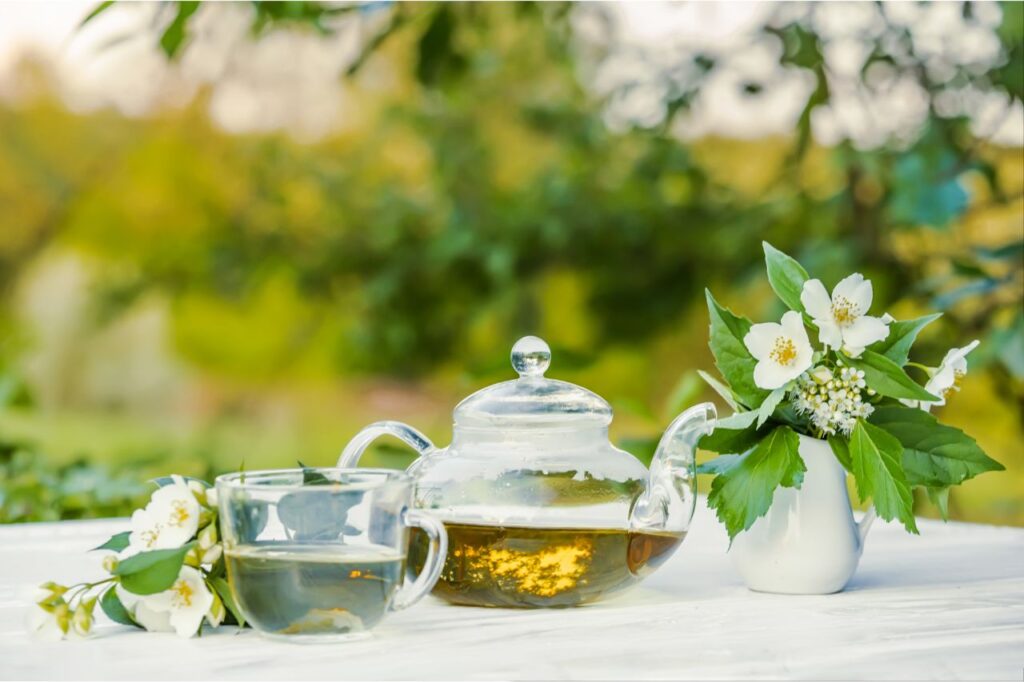
Tips For Brewing a Good Cup of Jasmine Tea
Did you know that you could make your jasmine tea taste even better? Pay attention to important brewing instructions to get the most refined flavor out of your jasmine tea.
You want your water temperature to be somewhere in the 190°F-195°F range. Additionally, make continuous checks while you steep. Exceeding the steeping time (even for just a few minutes) could affect the taste of your tea. It might turn out grassy or bitter.
You may want to experiment with any of these brewing approaches if you find the jasmine tea overly bitter or acidic. Possibly, the water was too hot. Or, you steeped longer than they should’ve been.
You may use another jasmine tea brand or blend if you still don’t like how the results turn out.
The Verdict: Does Jasmine Tea Have Caffeine?
Pure jasmine tea (coming from the flower itself) does not contain any caffeine. However, the typical jasmine tea that people like to drink today contains a true tea base. In these cases, jasmine tea does have caffeine.
So, if you’re trying to eliminate caffeine from your life, consume pure jasmine tea.
If you’re sensitive to caffeine or just attempting to keep a closer eye on your consumption,
One cup of adequately brewed jasmine tea should be safe. You can also try herbal jasmine tea blends!
